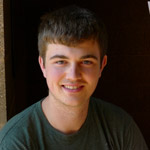Diagnosis? Winning essay
SJU senior writes essay that earns honor from New England Journal of Medicine
August 31, 2012
By Mike Killeen
For most people, Christmas Day routines do not include polishing an essay for the New England Journal of Medicine (NEJM). Last Christmas, Matt Syverson put the final touches on an essay and submitted it to a contest sponsored by the NEJM.
The Saint John's University senior received a belated Christmas gift when he was selected as one of 120 essay winners by the journal in celebration of its 200th anniversary.
"I was very surprised and happy to be one of the few selected for this honor," said Syverson, a chemistry major at SJU who currently works part time in the St. Cloud Hospital Emergency Trauma Center and hopes to become a doctor of osteopathic medicine specializing in emergency medicine.
NEJM's anniversary celebration highlighted medical accomplishments over the past two centuries. One of the most recent developments is how medical information is communicated to patients through the Internet and social networks.
"In the last 20 years, there have been profound changes in how information is communicated. The Internet and social networking have enabled everything from romance to revolution," NEJM wrote in soliciting comments for its essay contest, which asked writers to answer the question, "How can we harness this technology to improve health?"
Syverson, who graduated in 2009 from Jefferson High School in Alexandria, Minn., continued to follow the topic of social media in medicine after taking a class, "Theology, Biomedical and Healthcare Ethics," taught by Kathy Lilla Cox, assistant professor of theology at the College of Saint Benedict and Saint John's University, during spring semester 2012.
"I am very interested in the health care policy, public health and how new forms of media and communication can be used to disseminate ever changing health care information," Syverson said. "I took Dr. Cox's biomedical ethics class last semester, and the issues that we discussed were very helpful in confirming the validity of my essay."
"Matt was an engaged student," Cox recalled. "He periodically would stay after class to continue a discussion or ask additional questions. He showed particular interest during discussions about topics when the role of the health care provider, or physician, would arise.
"He wanted to think carefully about the fact that physicians have been trained and educated to provide specialized care to people. Yet, patients today want to be more involved in that care and often arrive with information they have gathered. He was already thinking about what the dynamic between a physician and a patient should look like, as an undergraduate planning on being a physician," Cox said.
Syverson started his essay by mentioning a British report that published a study by Dr. Andrew Wakefield suggesting a possible link between autism and the measles, mumps and rubella (MMR) vaccination of children. The study, which has since been discredited, caused MMR immunization rates in Britain to drop by around 20 percent, leading to multiple outbreaks of measles.
"By using the Internet and social networking, medical professionals are able to disseminate the factually correct information to counter the sometimes incorrect information and the hype created from perceived dangers to the public's health," Syverson wrote.
"I read an article on the Wakefield study that was discredited, and knew that's how I would start the essay," Syverson said, adding that he made multiple revisions over the course of the week leading up to his submission.
Syverson's essay was one of 120 selected by the NEJM - 40 written by undergraduate students, 40 from medical students and 40 residents. All the winning essays were posted online on the NEJM site.
As one of the winners of the contest, Syverson was also able to attend the Harvard Medical School Conference in June in Boston.
"I think the conference provided me with a great opportunity to hear some very intelligent people speak and network with residents, medical students and undergraduates from all around the world," Syverson said, adding he attended panel discussions on HIV/AIDS, maternal and fetal health, breast cancer and cardiology. "Of notable interest, Dr. (David) Ho, the person who discovered the three main drugs to fight HIV/AIDS, was part of the HIV/AIDS panel."
Syverson's success in the contest did not surprise Cox.
"Matt was very interested in questions pertaining to the physician-patient relationship and how technology shapes our understanding of what comprises good health care," Cox said.

